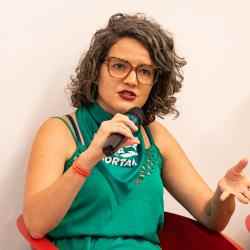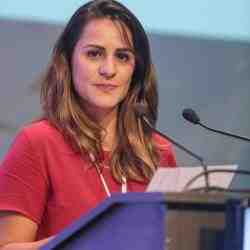Introdução
A leader in a growing community of communications specialists in Brazil, Gustavo Gindre Monteiro Soares has assembled a group of socially aware communications professionals to devise new ways of using communications to reach and serve average citizens. Employing a "living laboratory" methodology, the group is seeking more effective ways of heightening public awareness of and concern for pressing community needs.
A nova ideia
Two years ago, with a group of communications specialist colleagues in Rio de Janeiro, Gustavo Monteiro Soares founded the Institute for Society and for Communication Studies and Projects (INDECS). The idea for the new institute was born out of his frustration with what he saw as the tendency of social activists to reduce all problems to political and economic issues. He was also convinced that activist citizens' organizations were failing to communicate their ideas effectively, relying almost exclusively on the media to transmit their messages and eschewing the deeper and more varied approach that the task requires.Gustavo raised his concerns with a group of communications specialists who shared his view that the general public in Brazil must become more actively engaged in addressing social problems and that, with that end in view, the development of new and creative communications strategies would be essential. But Gustavo and his associates were also convinced that they and others in their profession had a great deal to learn before they could develop the needed new approaches.With those several needs in view, the Institute has launched two initial projects that employ a "living laboratory" methodology and are viewed as testing grounds for the development of practical, grass roots-based new approaches in the communications field. In the first project, Gustavo, his colleagues and residents in two communities near Rio de Janeiro are working together on a number of local communications projects, including radio and video production and local newspapers. In the second, a public commuter ferry is being used as a laboratory for the development and demonstration of more effective methods for enhancing public awareness and responsibility on environmental issues.
O problema
The idea that the actions of individual citizens contribute to a growing list of social ills, including pollution, violence and corruption, and that individuals must thus assume responsibility for addressing those problems, is broadly accepted in some societies as an important component of their cultural values. Unfortunately, however, such notions are not widely held in Brazil. Indeed, such ideas are so alien that social activists themselves often fail to identify the cultural values and patterns of behavior that reinforce negative habits damaging to the rest of society.
Some communications analysts believe that the mass media now play an overwhelmingly predominant role in defining the problems and solutions of the future, and that evolving cultural values will be largely determined by those who control the media. But for Gustavo, evolving cultural values will be influenced not only by persons who hold broadcasting rights and own motion picture and television studios, but also through the countless daily exchanges among private citizens in a wide variety of fora in which the mass media play an important but by no means exclusive role. In the mass media, Brazilians receive a daily onslaught of messages focusing on exploitation and violence and next to none suggesting important roles to play in combating such ills. In Gustavo's view, the principal challenge is to find promising new approaches for addressing that imbalance.
A estratégia
In the first of their experimental undertakings, the "Social University" project, Gustavo made contact in two typical communities near Rio de Janeiro with organizations that were already engaged in developing public education programs focusing on core community issues, including trash collection, preventive health measures and drug-related violence. Working closely with those activists, Gustavo and his colleagues are examining several alternative communications approaches and developing new strategies that will enhance the impact of their messages and emphasize underlying social responsibility values.
In the second of the experimental ventures, "Viva Barca" ("Living Boat"), Gustavo is using the daily commuter ferry boat from Niteroi to Rio de Janeiro to construct learning environments for adults and children. The thousands of daily commuters provide an excellent "captive audience" for an experiment in mass public education techniques, and the project's environmental messages focus on cleaning up Guanabara Bay, across which the ferry travels. To encourage new ways of thinking about environmental problems and taking personal responsibility for needed improvements, Gustavo has developed music, theater and other forms of cultural expression to reach the ferry commuters. A newsletter and on-board videos will reinforce those messages and introduce other related issues, including safe working conditions, basic sanitation and trash recycling.
In both projects, and in other undertakings as well, Gustavo is seeking new ways to use communications to promote pluralism, nonviolence and ecological harmony as cultural values at the grass roots level. And by introducing new forms of cultural expression that will gain wide public acceptance, he also hopes to nudge the mainline media in those same directions.
A pessoa
Gustavo was born and raised in Rio de Janeiro. He spent most of his college years as a student activist while earning a degree in social communication, specializing in journalism. While he was in college he set up an alternative student press service and collaborated with other activists to form an organization that engaged in leadership training, adult literacy and staff training for citizens' organizations in poor communities.
Gustavo's interest in transforming cultural values stems from his lifelong commitment to social change and his Buddhist practice, which calls for the harmony of thought and action.



